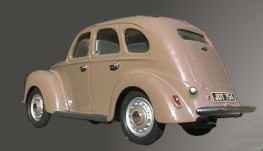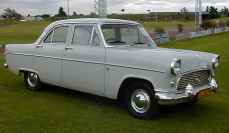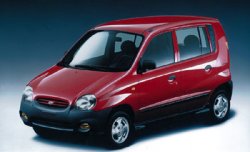Words & Derivations
Classic Cars
Nothing to do with Bristols or Bugattis - but why do so many automobile manufactures give their machines Latin names - or, failing that, what I'd call Latinish names - not actually Latin, but sound as if they might be to the uninitiated?
Cars named for Roman authority figures:
 Prefect:
Ford Prefect, as well as being a character in the Hitchhikers' Guide to
the Galaxy (not of course to the Ford People Carrier of that name), was
the name of the first car I ever bought. It was less than half the price
of the toy illustrated on the right,which costs £80! Prefects (Praefecti)
were senior officials in the Roman Empire - but like a Ford car, they
were regarded as socially inferior, as recruited mainly from the equestrian
class. A Praefectus was in charge of the corn-supply (Annonae), the Emperor's
Bodyguard (Praetorio) and the fire brigade (Vigilum). The name may well
owe as much to the implicit snobbery of the English Public School system,
where a prefect was a superior youth, but still inferior to a real old
master.
Prefect:
Ford Prefect, as well as being a character in the Hitchhikers' Guide to
the Galaxy (not of course to the Ford People Carrier of that name), was
the name of the first car I ever bought. It was less than half the price
of the toy illustrated on the right,which costs £80! Prefects (Praefecti)
were senior officials in the Roman Empire - but like a Ford car, they
were regarded as socially inferior, as recruited mainly from the equestrian
class. A Praefectus was in charge of the corn-supply (Annonae), the Emperor's
Bodyguard (Praetorio) and the fire brigade (Vigilum). The name may well
owe as much to the implicit snobbery of the English Public School system,
where a prefect was a superior youth, but still inferior to a real old
master.
 Consul:
better than a Prefect - the Consul had delusions of grandeur, which made
it the car to aspire to in the early 60s. Consul evokes the Empire On
Which The Sun Never Set as much as the Roman one. In the sixties, the
British Consul in a foreign land was the gentleman's Grand Tour rep. Roman
consuls came in twos. They were elected by the most undemocratic voting
system ever seen outside Florida, and only a small number of élite
families (the nobiles) could hope that one of their number would
become consul in "his" year (the year he reached 42, the minimum
age). Very occasionally would they allow fresh blood into the consulate.
It was very expensive - the words for candidacy and for bribery (see the
Octavia Ambiente below) were almost identical.
Consul:
better than a Prefect - the Consul had delusions of grandeur, which made
it the car to aspire to in the early 60s. Consul evokes the Empire On
Which The Sun Never Set as much as the Roman one. In the sixties, the
British Consul in a foreign land was the gentleman's Grand Tour rep. Roman
consuls came in twos. They were elected by the most undemocratic voting
system ever seen outside Florida, and only a small number of élite
families (the nobiles) could hope that one of their number would
become consul in "his" year (the year he reached 42, the minimum
age). Very occasionally would they allow fresh blood into the consulate.
It was very expensive - the words for candidacy and for bribery (see the
Octavia Ambiente below) were almost identical.
Senator: a posher car, but a less important figure in Rome. Most members of the upper class would be eligible to attend the senate, as entry was automatic for all ex-officials. But as a body, the senate continued to exercise auctoritas - even under the empire - although the potestas was in the hands of those who controlled the army.
Latin verbs:
Audi : 2nd person singular present imperative active of audio,
I hear, listen.The car company traces its origins back to 1899 and August Horch. In 1910, Horch was forced out of the company he had founded. He founded a new company and continued using the Horch brand. His former partners sued him for trademark infringement and the German court stated that the Horch brand belonged to his former company. August Horch was obliged to refrain from using his family name in connection with cars. As the word "horch!" is old German for "listen!" (= English "hark!") , August Horch used the Latin equivalent of his name, "audi!" for his next effort. Both Horch and Audi, along with DKW and Wanderer merged in 1932 to form the Auto Union, hence the four rings which are now the badge of Audi (possibly influenced by the Olympic Rings which were first seen at the Los Angeles games in the same year).
He founded a new company and continued using the Horch brand. His former partners sued him for trademark infringement and the German court stated that the Horch brand belonged to his former company. August Horch was obliged to refrain from using his family name in connection with cars. As the word "horch!" is old German for "listen!" (= English "hark!") , August Horch used the Latin equivalent of his name, "audi!" for his next effort. Both Horch and Audi, along with DKW and Wanderer merged in 1932 to form the Auto Union, hence the four rings which are now the badge of Audi (possibly influenced by the Olympic Rings which were first seen at the Los Angeles games in the same year).
Volvo: I roll, I turn, I run on wheels. Proud boast of a haughty car. Actually originally the name for the ball-bearings made by Volvo's parent company in Sweden, SKF.
Transit: back to Ford - he/she/it crosses. A long-lost part of a family that includes Introit (hymn) and Exit (all from Latin eo,ire,ii,itum, go). Sic transit gloria mundi [Gloria was unwell in the van after a weekend of over-indulgence]
Vito: I avoid. A Mercedes van - probably meant to suggest French vite (quick), or Latin vita (life). But it suggests Vito Corleone to me. I avoid.
Fiat: Let it be (as in fiat lux: let there be light)? Actually it's a mere acronym from Fabbrica Italiana Automobili Torino. Let it be anyway.
Latin Nouns:
Cortina: Successor to the Consul. A weird one this - the Latin for kettle. I know it was a tin can on wheels, but… Actually, probably named for the once-fashionable Italian ski resort at the foot of Mont Blanc, Cortina d'Ampezzo (so named as it's in a cauldron-shaped valley in the Alps?)
Corona and Corolla: Names for early Toyotas - the Crown and the Coronet. The car for the king of the road. Corona (also name of a fizzy drink) also means the group of people who surround a speaker or celebrity - one's fans. So quite a good one.
Carina: Another Toyota. A Japanese company who seem very loyal to Latin! Carina is the keel of a ship, and by metonymy, the ship itself. Or it can mean a nutshell: or conceivably it could be the imperative of carino, I abuse, revile. Only an owner could tell us whether it's a boat on wheels, a tough little nut - or is requesting you to shout rude words at it!
Focus: Latin "fireplace" - another superbly chosen name from Ford.
Astra: "stars". A nondescript Vauxhall for the less than stellar.
Ignis: "fire". A small Suzuki. Should keep well away from the Focus above.
Auris: what's this ear? (Latin auris = ear.) Toyota claim the prize for the first car named after a body part, though I'm certain others will follow. Lamborghini Penis?
Latin Adjectives:
Viva - Latin for "alive" - name for a nasty small Vauxhall. Simply to be driving one was considered sufficient reason for the police in my local town to stop a friend. "Why did you stop me, officer?" "You was driving a Vauxhall Viva, sir."
Nova - successor to the Viva - "new". Unfortunately, in Italian, it means ""won't go" (no va) - and export sales were disappointing.
Previa (Toyota): Unfortunate associations with placenta (Latin="cake") for anyone who's had a baby. Praevia means "ahead on the road" - good name for a car, nasty as a cake.
Agila - another Vauxhall. Not-quite-latin, which would be agilis. "Active", "busy" - certainly an improvement on previous efforts!
 Amica - Hyundai were probably told it means "friendly". No. It means
"concubine, mistress, courtesan" (Lewis & Short: try a Google
image search for "amica"!). But would you want your mistress
to be seen driving one?
Amica - Hyundai were probably told it means "friendly". No. It means
"concubine, mistress, courtesan" (Lewis & Short: try a Google
image search for "amica"!). But would you want your mistress
to be seen driving one?
Matrix - another Hyundai - probably named to cash in on the Keanu Reeves films. But they didn't check in the dictionary: it's a breeding animal originally (a cow for instance). Can also mean "womb", or "mother" in the sense of "the original". The mother of all boring cars?
Carens. A real puzzle! Why would anyone want to call their car "deficient" or "lacking" (which is what carens means in Latin)? Perhaps the answer is in the manufacturer's name : KIL , which I always want to pronounce as "kill!" The lambda (supposedly actually an A) at the end of the word is the universally recognised sign for omission - the caret, familiar to anyone who's ever had an essay marked! But possibly it's deliberate - an online review of the motor says "If style, image and status are important to you, the new KIA Carens just isn’t your kind of car." Diffy by name and diffy by nature.
Roman Aristocracy:
Octavia (with a model called - ungrammatically - "Ambiente" - ambiens signified going round bribing the voters: an ideal car for a Blair/Cameron Babe seeking reelection?). But which Octavia are we to conjure up when we see this Skoda? The dull sister of Octavian (not yet Augustus) whom Mark Antony abandoned to go off with Cleopatra? Or Nero's wife - daughter of the emperor Claudius - whom he kicked to death while expecting his baby? Neither really seems to evoke class.
Fabia: another Skoda. Cicero's sister-in-law was a Vestal Virgin called Fabia. Or there was the Fabia who murdered her husband Fabius Fabricianus, to get off with a young man she fancied. Her son grew up to murder his mother and her lover. Virtue or vice. Take your pick. The Skoda marketing team need to bone up on some Roman history.
Mythology:

Clio: the miniature Renault named after the Muse of History - which is what the car now is.
Orion: Ford wins again. The giant Orion was originally called Urion, to celebrate his origin: he was born from the urine of Zeus, Poseidon and Hermes, who, travelling around Greece in disguise (as gods tended to), promised an old childless widower who'd shown them exceptional hospitality that he could have a son without the bore of getting married again. He was told to produce the skin of the ox he'd so generously sacrificed. The three gods urinated on it, and the old man buried it in the ground. Nine months later, a huge, but beautiful child emerged. He grew up to become a favorite of Artemis, and became famous as the mighty slayer of beasts. He died from the bite of a scorpion - a creature the Earth produced specifically to destroy the man who'd boasted he could conquer the entire animal kingdom. Other authorities say Artemis killed him for the attempted rape of one of her nymphs.
Scorpio: Keep well away from one of these if you are driving an Orion - see above.
Mercury: Roman form of Hermes, the communication god and god of the streets. As such he was patron of thieves and luck, and, in Athens and elsewhere in ancient Greece there were symbolic statues of him on every street corner [above] - which Athenian men would touch in passing to ensure they "had a nice day".
Cressida (Toyota) Told by Jim I'd missed this one: however, she does not appear in Classical myth. Troilus does - a blameless son of Priam caught by Achilles while off to fetch a pail of water. But the faithless Cressida gets her first mention in Chaucer, and then more extensively in Shakespeare. For Pistol, groping for insults to besmirch Bardolph in Henry V, she is an archetype of the disease-ridden whore:
No; to the spital go,
And from the powdering tub of infamy
Fetch forth the lazar kite of Cressid's kind,
Doll Tearsheet she by name, and her espouse:
(As Jim writes: "Not exactly the image a manufacturer would wish to project, I think!!!" )
Cressida was procured for Troilus by Pandarus, "the first pander". But the Fiat Panda has zoological connections, of course.
Phaeton Once a rich man's personal high-speed horse & cart, now a new luxury VW - both named after Phaethon, son of Helios the Sun.
He was a good-looking young man, whose already excessive vanity was exacerbated by favours from the goddess of Love, Aphrodite. Stung by accusations of bastardy, he decided to confirm his paternity by visiting Helios in his palace. His father not only accepted him, but promised to grant him anything he wanted. Phaethon begged to be allowed to drive the horses and chariot of the sun across the sky for just one day. One day was enough for him to lose control of the vehicle completely, and threaten to set fire to the entire earth. Zeus was forced to kill him with a thunderbolt.
As a name for a car, it would seem on a par with Icarus Airlines, or Medea Childcare Services. But do check out their website - it's beautiful, and does make an effort to justify it!
Odyssey From Michelle Vitt, Saint Paul, Minnesota, quoted in "A Word A day" 20 October 2014:
"I am a Latin teacher and drive a Honda Odyssey. For years I have told my students that I thought this was the worst name for a car as I don't want my journey home to last 10 years and be populated with misfortunes and monsters! Thank you for many wonderful years of words! "
The Greek Alphabet:
Alfa (Romeo): the beginning
Omega (Vauxhall): the end.
Big and Little:
The Austin/Morris/BMC/Leyland/Rover gave us the Mini (from Latin minimus, smallest) more or less contemporary with the miniskirt in the sixties. (Although I remember playing with toy cars called Minic in the fifties). Then, as hemlines fell we got the Maxi. Japan gave us the Nissan Micra (from the Greek - but feminine of course, as all cars tend to be.
Near Latin:
Avensis : suggests Latin avena, oats, becoming the word for any stalk, then a shepherd's pipe (Pan Pipes) made of reeds. It even has the -ensis ending which is commonly used to make a noun into an adjective. Brings to mind a simple sunny world of shepherds abiding in the fields.
Tigra (Vauxhall): female tiger? Actually this was tigris, but still the ideal car for the thrusting female executive.
Felicia: suggests felix, felicitas etc - happiness and good luck, the birthright of every Skoda driver.
Primera (Nissan): suggests primus, first? Or a female Latin primer?
Vectra (Vauxhall): suggests a connection with vecta, "having been conveyed, riding" from L veho (from which vehicle also derives)
Mondeo (Ford): sounds like a 2nd conjugation verb (moneo - I warn: "Warning! Get out of my way, you drivers who are not important executives like me driving my top-of-the-range company car".) Also suggests French monde, from Latin mundus - the world. Mondeo drivers are men-of-the-world bent on world domination. Keep well clear.
Corsa (Vauxhall): suggests cursus, race-course, or career; a fashionable high-street in every Italian town (corso); corsage and maybe even corset! (It was advertised by Supermodels when it was launched, remember). Also a touch of "corsair" - a free-booting devil-may-care pirate. To me, alas, it has always recalled the rhyme about the two early Saxon invaders of Britain:
Hengist was coarser than Horsa
And Horsa was awfully coarse.
And what about Nubria (Daewoo) - a tall sleek African woman (Nubia) with a suggestion of clouds (nubes)? Xantia (Citroen) - should be driven by a blonde (Greek xanthos, xanthe) - was this the one advertised by Claudia Schiffer in her underwear? (If not, should have been).
The Mitsubishi Carisma is a name touched with genius - Greek charisma (charm, grace) is there, plus Latin carus (dear: beloved - and expensive) - and also sounds like a new art form where the car is the star! The Malaysian Proton is exactly the Greek proton, first. Suzuki have given us the Alto, and , bizarrely, the Baleno, which suggests a whale. Why?
From Stephen (Sept 2002):
Hi Andrew! Just browsing your classicspage on car names, and spotted one possible hole: the Renault Laguna... [should be the Lacuna? ed.] Have you noticed that the Proton Persona doesn't have one, while the Mitsubishi Carisma doesn't have any?

